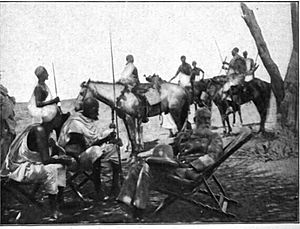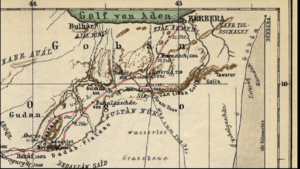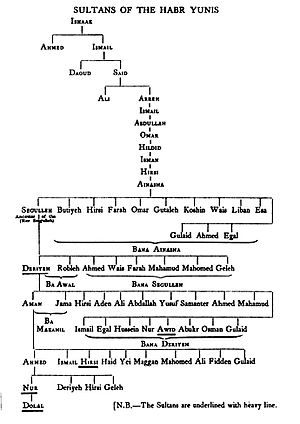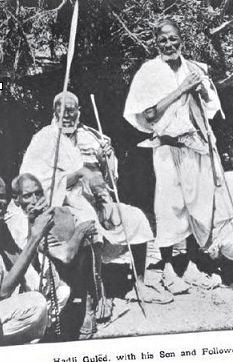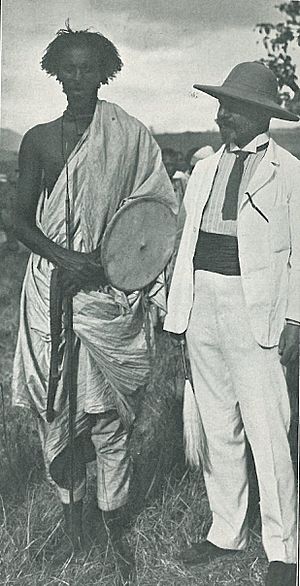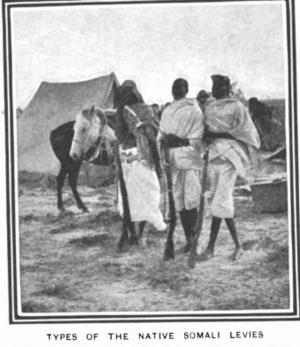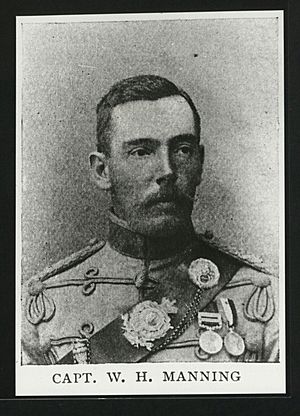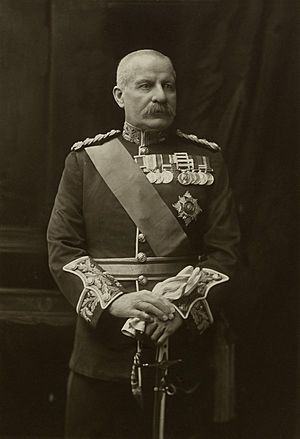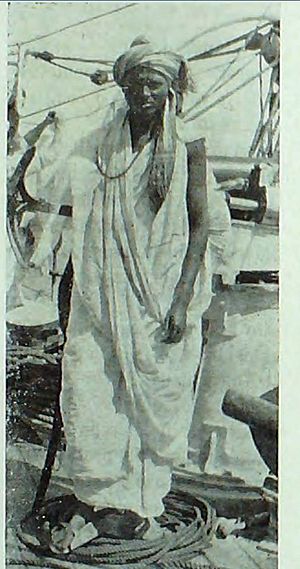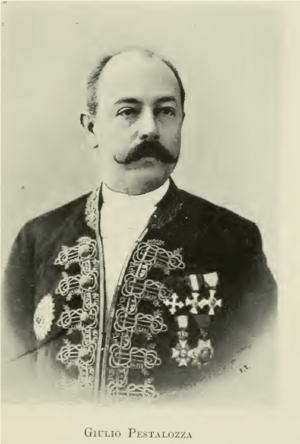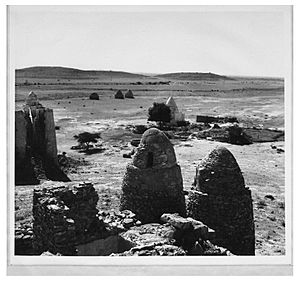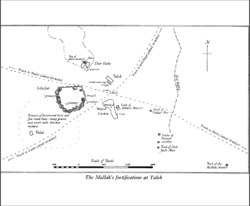Nur Ahmed Aman facts for kids
Quick facts for kids Sultan Nur Ahmed Amanسلطان نور أحمد أمان |
|
|---|---|
| 3rd Sultan of the Habr Yunis Sultanate | |
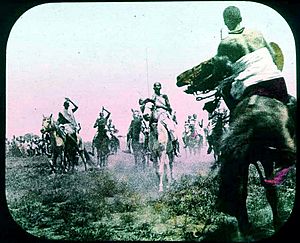
Sultan Nur (centre) in the Tuuyo plains (1896)
|
|
| Reign | 1879-1907 |
| Predecessor | Hersi Aman |
| Successor | Dolal Nur, Awad Deria |
| Born | 1841 Oodweyne, Habr Yunis Sultanate |
| Died | 1907 Taleh, British Somaliland (now Somaliland) |
| House | Ainanshe |
| Religion | Sufi Islam |
Sultan Nur Ahmed Aman (Somali: Suldaan Nuur Axmed Amaan; 1841–1907), also known as Nuur Dheere, was an important religious leader. He became the 5th Sultan of the Habr Yunis Sultanate. Later, he was one of the key figures in the Somali Dervish movement and revolt (1899–1920).
Sultan Nur played a big part in gathering people for the Dervish uprising. He was against the French Roman Catholic missions. He helped get people and weapons ready. In August 1899, he hosted the rebelling tribes in his area in Burao, officially starting the Dervish rebellion. He led battles from 1899 to 1904. He and his brother, Geleh Ahmed, signed a peace treaty with the British, Ethiopians, and Italians on March 5, 1905. This was called the Ilig Treaty or Pestalozza agreement. Sultan Nur is buried in a white-domed tomb in Taleh, which was the Dervish capital. This shows how important he was in starting the movement.
Contents
Early Life and Rise to Power
Sultan Nur came from a long line of leaders. He was a direct descendant of Ainanshe Hersi, a Habr Yunis chieftain from the 1700s. He was also the great-grandson of Deria Sugulle Ainanshe, who became the main Habr Yunis sultan in 1836.
Before becoming a sultan, Nur spent much of his early life studying religion. He was a Sufi student in places like Hahi and Berato. These were centers for the Ahmadiyya tariqa (a type of religious brotherhood). Some records say he could speak Arabic, and some even say he could read and write it.
Nur became sultan after his uncle, Sultan Hersi Aman, died in 1879. Sultan Hersi was killed in a fight between clans with Haji Guled, a wise elder who was also his uncle. This war led to many poems being written, including one by a young teenager named Jama Amuume.
Nur becoming sultan caused a civil war that lasted about ten years. His great-uncle, Awad Sultan Deriyeh, declared himself a rival sultan in 1881. This long conflict was written about by Drake Brockman, a doctor in British Somaliland.
Nur's rise to power happened around the same time as the Mahdi uprising (1881–1885) in Sudan. Religious messengers from different Sufi groups visited the Somali coast. Nur welcomed the Senousi messengers. In 1890-1891, Awad Sultan Deriyeh was killed. His nephew, Mattar Hersi, was then chosen as a rival sultan by some groups. In February 1899, Mattar Hersi got support from religious leaders at Kob Fardod, and Mohammed Abdullah Hassan began to support him.
The Habr Je'lo people praised Sultan Nur in a poem:
|
First we salute thee |
{{{2}}} |
The Dervish Movement Begins (1899)
In February 1899, Mohammed Abdullah Hassan, who later became the Dervish spiritual leader, first caught the attention of British officials. This happened when some livestock belonging to religious leaders at Kob Fardod was taken. Sultan Nur came to Kob Fardod after his rival, Sultan Madar Hirsi, helped the religious leaders get their animals back. This made the religious leaders support Madar's claim to be sultan.
The Mullah (Mohammed Abdullah Hassan) was not well-known to the British until February 1899. He had not caused major uprisings before this. In fact, he lived in Berbera, and his relatives held important jobs in the British administration there. For a while, the Mullahs and the British talked peacefully about getting their animals back.
However, things changed. On March 29, 1899, the British asked for a stolen rifle back. The Mullah denied knowing about it. On April 10, a British messenger reported that the Mullahs and tribesmen at Kob Fardod were acting hostile. They called him a "Kafir" (a non-believer) and had rifles.
By the end of April 1899, the group officially called themselves "Dervish." They declared themselves independent, with their own leader (Amir), Sultan (Nur), and chiefs. They didn't declare war yet, but they wanted to be recognized as an independent community.
In June 1899, Sultan Nur left Kob Fardod to gather more men and weapons from his clan in the west. The British asked him about his plans, but he didn't reply. He tried to get his clan to join the rebellion, but many refused. So, Sultan Nur went east to Burao, where other parts of his clan supported the Dervish cause.
By the end of August 1899, the Dervish gathered at Burao and declared open war. On September 1, a letter arrived in Berbera from Burao, which was basically a declaration of war.
In September 1899, the Dervish attacked the western Habr Yunis at Odweina. Sultan Nur wanted to punish those who didn't join the rebellion. They also burned and looted the Ahmadia Tariqa at Sheikh. In October 1899, the Dervish murdered Girad Ali Farah, a chief who had rejected their cause. By November 1899, the main Dervish forces moved into Ethiopia.
Battles and Conflicts (1901–1904)
The Dervish movement was an armed rebellion that started in 1899 and lasted until 1920. It began because religious leaders and others were against the French Catholic Mission. They didn't like the mission educating children or trying to convert them to Christianity. They also felt the British were interfering with their independence.
News of children being converted to Christianity by the French Catholic Mission in Berbera in 1899 was spread by Sultan Nur. This event helped start the religious rebellion that became the Dervish movement. Even though the Dervish were against Christians, they mostly attacked Somali nomads who didn't support them. For twenty years, the Dervish looted and killed many Somali nomads.
In 1909, the French Catholic Mission in Berbera was closed by the British. This was because many clans demanded it, as it was a reason for Dervish raids. The clans also wanted the Dervish to be stopped.
From 1914 to 1919, the British worked to weaken the Dervish. They used soldiers from the King's African Rifles, the Somaliland Camel Corps, and local scouts. Finally, in 1919, a plan was made to defeat the Dervish using airplanes. In early 1920, Dervish forts were bombed. Many Dervish were killed, captured, or fled. A final raid by Somali horsemen ended the movement that had caused trouble for two decades.
The Dervish movement had its spiritual leader, Mohammed Abdullah Hassan, its Sultan, Nur Ahmed Aman, and its chief assistant, Ahmed Warsama Haji Sudi.
Samala Battle (June 1901)
By December 1900, the British had 21 officers and 1,500 Somali soldiers ready to fight the Dervish. Ethiopia also sent 8,000 soldiers to help. In May 1901, British forces burned the Dervish settlement at Kob Fardod. They also took 3,500 camels from tribes that supported the Mullah.
On June 2, these tribes and Dervish forces attacked a British camp at Samala to get their animals back. The Dervish leaders, including Haji Sudi, Sultan Nur, and the Mullah, watched the battle. The Dervish attacked several times but were pushed back. They lost many fighters, while the British had fewer casualties.
After failing to get their animals back, the Dervish retreated. Sultan Nur had convinced the Dervish to attack this camp, hoping to get rifles. The Dervish then accidentally met another British force but managed to escape.
Ferdiddin Battle (July 1901)
The Mullah gathered his most dedicated followers, the true Dervish, and returned to British Somaliland. British forces attacked the Dervish at Ferdiddin. The Dervish lost many important religious leaders and over 60 fighters. Many more died while fleeing through the dry land. Haji Sudi, the Mullah, and his eldest son survived by drinking water from slaughtered camels. The Dervish fled south into Italian territory.
Erigo/Erego Battle (October 1902)
In December 1901 and February 1902, the Dervish attacked Habr Tojaalaa, Habr Yunis, and Dolbahnata tribes. Many refugees filled Burao and Berbera. In October, British-led forces found the Dervish hiding in thick bushes. The Dervish attacked from all sides, causing some British lines to fall back. However, the British eventually held their ground. The Dervish lost many fighters, including 62 dead and all 6 of their commanders.
Meanwhile, a Somali officer, Risaldar-major Musa Farah, attacked Dervish tribal allies in the west. He gathered 5,000 tribesmen, defeated the Dervish, and captured many animals. For this, he received a sword of honor from King Edward VII.
Even though the Dervish leaders were not captured, the British were happy with the results of these expeditions.
Gumburu and Daratoleh Battles (April 1903)
A new British commander, Sir William Henry Manning, launched a third expedition in January 1903. The plan was to surround the Dervish. The Dervish leaders, hearing about the British forces, gathered their tribal allies.
In March, the British found the Dervish forces in Galadi. A small British patrol was sent and was surrounded and defeated by the Dervish. All 9 officers and 89 soldiers were killed. This battle happened on a small hill called Gumburu. Another Dervish force was defeated by the British at Daratoleh.
After these battles, the main Dervish forces moved to Halin. A deserter from the Dervish reported that Sultan Nur was still with the Mullah but was no longer eager to help him. The Mullah was absent from the Gumburu battle, and Sultan Nur largely commanded the Dervish fighters. This caused a disagreement between them. These two battles were the only Dervish victories over the British.
Jidballi Battle (January 1904)
Major-General Charles Egerton took command of the British forces, with new soldiers from India and Aden. He improved roads and water supplies. He also created two new Somali mounted groups. The Dervish were camped in the Halin-Gerrowei-Kalis area, with Halin as their main base. They also took over a small port at Illig.
In December 1903, the first clashes happened near Jidbali. On January 10, 1904, the Dervish fought regular troops in an open area for the first time. The British forces were the largest they had faced. The Mullah was not present at this battle. The Dervish tried to attack but could not stand against the intense British gunfire. Their lines broke, and they fled, chased by the mounted Somali groups. This completed the defeat of the Dervish army.
Peace Agreement (1904–1905)
The Mullah himself started talks for peace in March 1904. An Italian diplomat named Giulio Pestalozza helped with the negotiations. Abdallah Sceri, a trusted man of the Mullah, acted as an intermediary.
After long talks between Britain, Italy, Ethiopia, and the Dervish, a Dervish group came for a peace agreement. On March 5, 1905, the Treaty of Ilig (also called the Pestalozza agreement) was signed. Sultan Nur and other important Dervish leaders signed the agreement.
The Dervish became a protected religious community under Italy. They had their own semi-independent area. They agreed to live peacefully with their neighbors. The Italians gave the Dervish access to the sea. They also allowed the Dervish to use certain areas for grazing their cattle in British Somaliland. On March 24, 1905, the agreement was confirmed.
However, less than a year later, the Dervish and the Mullah started raiding again. The Mullah was not happy with the money he received from the agreement. He felt Italy had not kept its promises.
Sultan Nur's Death (1907)
The last time Sultan Nur was mentioned in Italian records was in 1907. He died in 1907 or 1908 in the Dervish camp at Illig. After his death, his son, Dolal Sultan Nur, became sultan in the Dervish camp. Among the Habr Yunis clans who were not Dervish, Jama Sultan Hirsi Aman (Sultan Nur's cousin) was made sultan.
Sultan Nur was buried by the Dervish in a large, domed tomb in Taleh. His white tomb in the Dervish capital shows how much he contributed to the movement. Only four Dervish founders are honored in Taleh, and Nur is one of them. A British geologist, William Archibald Macfadyen, described the tombs in detail in 1931.
See also
- Haji Sudi
- Abdallah Shihiri
- Sultan Deria Hassan
- Mohammed Abdullah Hassan
- Dervish state
- Sharmarke Ali Saleh
- Sheikh Madar
- Garhajis
- Isaaq
Images for kids
 | Kyle Baker |
 | Joseph Yoakum |
 | Laura Wheeler Waring |
 | Henry Ossawa Tanner |


